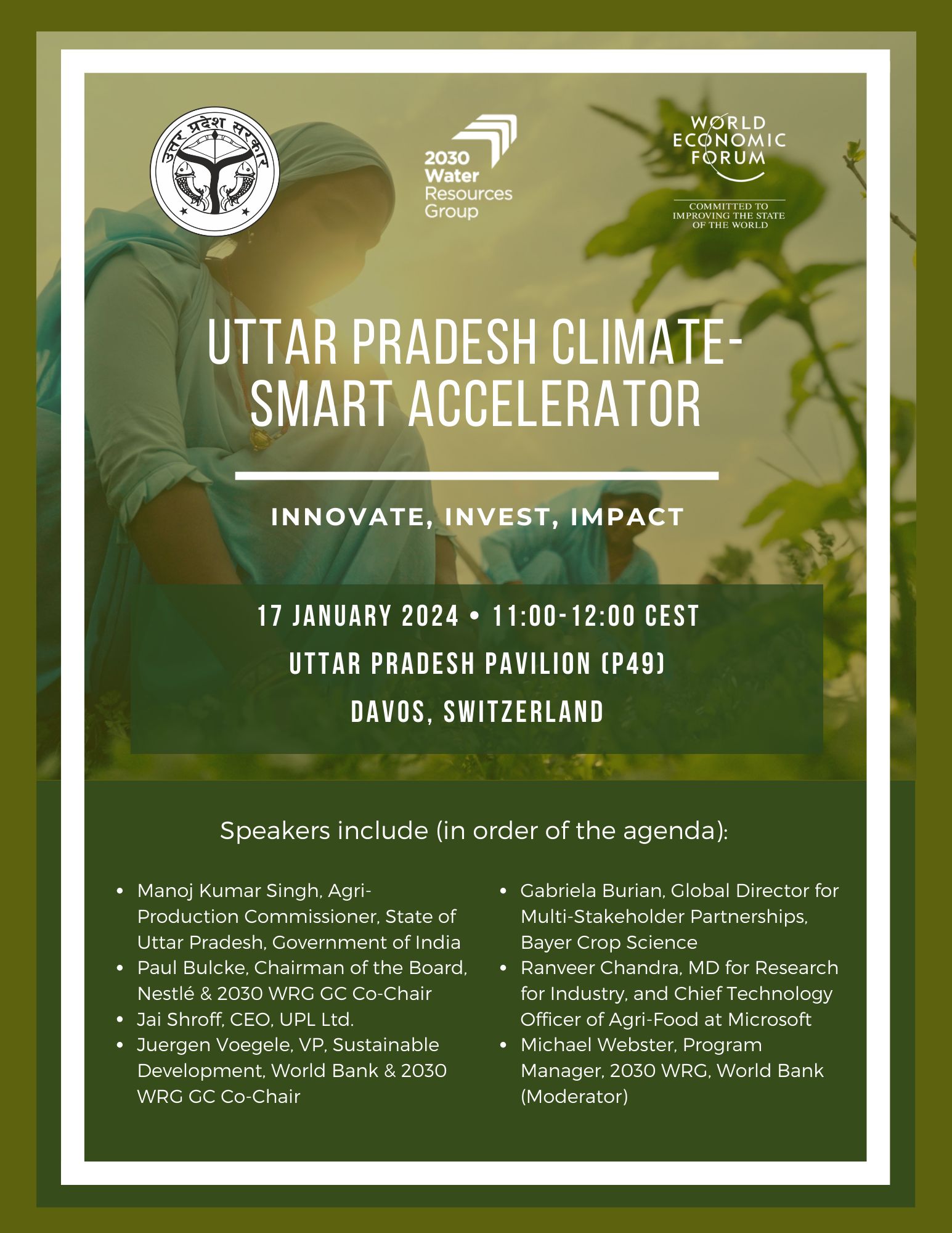Uttar Pradesh Climate-Smart Accelerator: Innovate, Invest, Impact – Davos 2024 Side Event

UTTAR PRADESH CLIMATE-SMART ACCELERATOR: INNOVATE, INVEST, IMPACT
SIDE EVENT – DAVOS, ANNUAL MEETINGS
When: Wednesday, 17 January 2024, 11:00-12:00 CEST
Venue (for on-site session): Uttar Pradesh Pavilion, Promenade 49 (P49), 7270 Davos Platz, Switzerland
Session recording below (or click here to view on YouTube):
To learn more about the Uttar Pradesh Climate-Smart Accelerator, download this brochure and watch the video below.
Davos Session Description:
At the recent COP28 meetings in Dubai, the global community set forth a bold vision to address the pressing challenges in agriculture and climate change. The World Bank President articulated an ambitious strategy, delineating five pivotal targets that set the stage for transformative action.
Over the next year-and-half, as part of a blueprint for methane reduction, the World Bank will help launch 15 national programs that aim to slash methane emissions across rice production, livestock operations, and waste management. This methane reduction blueprint could slash up to 10 million tons of methane. Central to this vision is a resolute commitment to addressing the challenges faced by small and marginal farmers who navigate depleting resources, climate uncertainties, and market volatility. The imperative to produce more while contending with these hurdles is stark. Yet, within this challenge lies an opportunity – an opportunity to revolutionize rice production.
The Government of Uttar Pradesh and the 2030 Water Resources Group (2030 WRG) of the World Bank have joined hands to establish the UP-Accelerator Program, which aims to improve farmer incomes, while lowering the carbon and water footprints in agriculture by leveraging technology and innovations from the private sector.
Uttar Pradesh is India’s most populous State and an agricultural powerhouse. The state tops the chart in the production of major agricultural and horticultural commodities including fruits and vegetables, milk, meat, mangoes, sugarcane, and rice from an estimated 17 million hectares of agricultural cultivated area, which is among the largest cropped acreage in India. Rice, which is estimated to be responsible for up to 43% of the global irrigation draw-down, is grown in approximately one-third of the farms in the State by small and marginal farmers. Solutions like Alternate Wetting and Drying (AWD) and Direct Seeding in Rice (DSR) offer a low-emissions alternative approach to production. These approaches not only reduce water consumption by up to 30% but also curtail methane emissions by nearly 50%.
Over 60 minutes, this session at the Davos Annual Meetings spotlighted and discussed the partnerships opportunities for transitioning to low-emissions food systems while achieving multiple wins for the people and our planet.
The Government of Uttar Pradesh invited corporate leaders, business partners and climate champions to work together with the small and marginal farmers of the State and invest in reducing emissions in key crop value chains assisting its transformation into a global hub for climate-resilient agriculture.
Co-Conveners:
- Government of Uttar Pradesh, India
- 2030 Water Resources Group (2030 WRG) and the World Bank Group
For questions, contact Alida Pham, External Affairs Officer, apham4@worldbank.org
